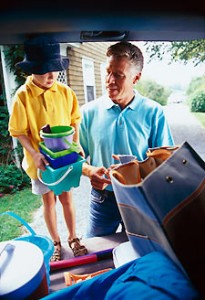In our ongoing series on summertime fun, we are pleased to offer the expertise of one of our Parents Place occupational therapists, who offers thoughtful recommendations to parents of children with sensory processing disorders:
 School is coming to an end, and summer is before us. It is a time for families to spend more unscheduled time together, which in many cases, involves travel. Traveling with a child who has sensitivities or a sensory processing disorder can prove quite challenging. The summer brings many changes for a child, including new routines, out-of-town company, groups of new kids, and different demands and expectations. Add to those changes the family vacation. For the child who seeks routines, schedules, and consistent expectations, a trip to the “unknown” can be very disruptive. Here are some suggestions and tips to help make your trip a happy one:
School is coming to an end, and summer is before us. It is a time for families to spend more unscheduled time together, which in many cases, involves travel. Traveling with a child who has sensitivities or a sensory processing disorder can prove quite challenging. The summer brings many changes for a child, including new routines, out-of-town company, groups of new kids, and different demands and expectations. Add to those changes the family vacation. For the child who seeks routines, schedules, and consistent expectations, a trip to the “unknown” can be very disruptive. Here are some suggestions and tips to help make your trip a happy one:
- Provide your children with a special backpack that contains all of the items they may need for self-regulation. You may wish to include sunglasses to block out bright light, gum to chew, or headphones to block out hard-to-tolerate sounds. A weighted lap pad or blanket can be useful for those long trips in the car or plane. The added weight of carrying a backpack can help with the transitions from one place to another. Think about the regulators you child uses at home. Bring or adapt items for travel.
- Discuss the trip ahead of time. If there are pictures that children can look at in advance, they often can visualize the unknowns ahead of them. If visiting family, photos are a great way for children to recognize and feel comfortable with their family members and the places they are going to see.
- Avoid major triggers. If your child struggles with crowds, loud noises, or visual over-stimulation, try to avoid these situations as much as you can.
- Routines are important for children with sensory processing challenges. Keeping to a routine as much as possible may help reduce anxious situations.
- Pretend play before a trip can also help ease anxiety. Practice “going to the airport” or sleeping in a sleeping bag. Giving multisensory input—such as sounds, touch, and smells—may help prepare children for particular sensations they may experience on the trip.
- Pace yourselves accordingly. Try to limit the number of transitions children have to experience each day. Treasure the times your children can participate in an activity without a meltdown!
Summer vacation is a time to be anticipated with excitement. You can help create wonderful lifelong memories by limiting expectations, letting things go, and—most important of all—enjoying your little ones for who they are.



